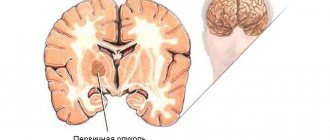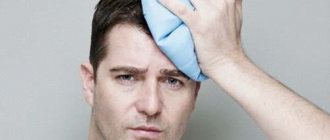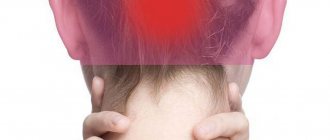Constant headaches are a common reason for patients to turn to neurologists at the Yusupov Hospital. People experience headaches in the evening, in the morning after sleep, which do not go away after taking painkillers, and at night. Frequent headaches in men can occur in the presence of pathology of cerebral vessels or brain tumors.
Persistent headache is an indication for a comprehensive examination of the patient. Neurologists conduct instrumental analyzes using the latest equipment from leading global manufacturers. Analyzes are performed by experienced laboratory technicians. Patients are advised by candidates and doctors of medical sciences. Leading specialists in the field of headache treatment collectively develop tactics for managing patients whose headache does not go away for several days.
Non-pathological causes of daily headaches
Brain activity is disrupted due to minor disturbances in blood supply, metabolism, and innervation. Night headaches occur for the following reasons:
- lack of oxygen;
- high temperature in the bedroom;
- drinking alcohol in the evening;
- overwork.
Healthy sleep depends on bedding and posture. On a high pillow, the cervical spine bends strongly. Even in the absence of discomfort during sleep, muscle tension occurs and cerebral blood flow is disrupted. Sleeping without a pillow can also cause pain in the head and neck. Low-quality fabric dyes and softeners used to wash bed linen often contain harmful ingredients that cause breathing problems and headaches in the morning.
Experiences and intense mental activity in the evening lead to brain overstrain. At night he cannot switch off. The patient cannot sleep and often wakes up. After waking up, you feel discomfort, pain in the head, and fatigue. He gets morning headaches.
Your job may affect brain function and age
Many of us say that we feel tired and exhausted after a long day of work, especially if you have a shift schedule and work at night. A new study has found that work activity may actually be responsible for the deterioration of brain function and may also cause premature aging of nerve cells.
A study published in the Occupational and Environmental Medicine journal states that working 24-hour shifts and night shifts can prematurely age the brain and impair cognitive abilities.
The analysis found that the brain had some ability to repair itself after shift work stopped, but it took about five years to return to normal functioning.
Pathological causes of headaches
A common cause of nighttime headaches is oxygen deficiency. It may be caused by abnormalities of the nasal passages and respiratory tract diseases. Night headaches occur after sleep apnea.
Blood supply to the brain is impaired during hypotension. The outflow of venous blood worsens due to a decrease in the tone of the intracranial veins. In the morning the patient feels it in his head.
With arterial hypertension, blood pressure may increase during sleep. The reason is the patient’s age, disruption of sleep and rest patterns. Vascular tone is impaired in diseases of the thyroid gland and heart. Nocturnal hypertension is dangerous for the development of heart failure and stroke. Headache occurs at night or in the morning.
Stress, anxiety, and mental trauma affect the central nervous system and change vascular tone. This provokes an increase in blood pressure and irritation of pain receptors in the walls of blood vessels. Night headaches that occur under the influence of psychogenic factors are varied in nature. They are accompanied by irritability, rapid heartbeat and are not relieved by analgesics.
Diseases of the cervical spine and temporomandibular joint can provoke night headaches. With back pain, a person is forced to take an uncomfortable position, which causes spasms of the neck muscles. They cause headaches.
Failure to comply with the dosage of glucose-lowering medications or refusal to eat dinner in diabetes mellitus results in a sharp decrease in blood glucose levels and severe headaches. Histamine disease is characterized by prolonged attacks of acute headache in the orbital area in the evening and at night.
In the presence of brain tumors, patients complain of night and morning headaches. As the disease progresses, it intensifies. The head hurts when changing position, the patient's hands go numb.
Throbbing morning headaches are felt during migraines. They often intensify when the light is turned on and are accompanied by nausea and vomiting. Constant headaches that bother the patient night and day are characteristic of brain infections.
Serotonin and melatonin
The production of melatonin directly depends on another hormone - serotonin, which is produced by the pineal gland during the day. We can say that serotonin is the antonym of melatonin, since it is produced only in sunlight.
The relationship between them is simple: the more serotonin is produced, the more melatonin is produced. Moreover, the first hormone is no less important than the second. It controls intestinal peristalsis, regulates feelings of anxiety and joy, and constricts arteries so that wounds on the body heal. Serotonin also stimulates areas of the brain that control sleep and wakefulness.
Cluster headaches
Attacks of cluster (bundle) headaches occur in paroxysms and are difficult for patients to tolerate. The pain has the following characteristics:
- localized in the eye area;
- radiates to the forehead, temple, cheek;
- accompanied by lacrimation, sweating of the forehead, a rush of blood to the face;
- more acutely felt when the patient is lying down;
- starts and goes away suddenly.
Night headaches begin without cause between 9:00 p.m. and 9:00 a.m. The peak of pain occurs at night, from zero to three o'clock. Attacks occur cyclically, followed by painless periods. Attacks are observed mainly in men. Pain occurs after drinking alcohol.
Men whose relatives suffer from cluster pain are at risk. The risk of developing a painful attack increases with head injuries, migraines, sleep disorders, mental and physical stress. Neurologists include possible causes of cluster headaches:
- abnormalities of the hypothalamus;
- pathology of blood vessels;
- disruption of circadian rhythms.
Patients relieve an acute attack at home with lidocaine drops in the nose. For symptomatic therapy, neurologists prescribe special medications and oxygen inhalations. In difficult cases, electrical stimulation of the brain is performed and the nerves that cause pain are removed. During the cluster period, doctors recommend giving up alcohol and nicotine.
How does nighttime activity affect the psyche?
Working long hours and lack of sleep can also affect your mental health. A number of studies have linked night shifts to an increased risk of depression. For example, in 2021, Korean scientists surveyed more than 14 thousand employees of an electronics manufacturing plant and found that night workers were more likely to experience symptoms of depression and suicidal thoughts. At the same time, the risk increased significantly among those who complained of insomnia.
Researchers in Taiwan came to similar conclusions. After analyzing data from a survey of more than 16 thousand local workers, they found that those who worked at night slept less than people with a standard daytime schedule. They were more likely to report insomnia and signs of burnout and mental disorders classified as “minor” psychiatry, including symptoms of moderate depression and anxiety disorders.
The authors of this study also believe that lack of sleep is the main cause of mental problems that arise when working at night.
Interestingly, a number of psychiatrists use sleep deprivation (intentionally staying awake for one or more days) to relieve symptoms of depression and bipolar disorder, with promising results. This indicates that disruptions in the body's circadian rhythms are closely related to the processes leading to the development of these disorders. Today this technique remains experimental. Doctors studying it stress that you should never try it yourself—too little is known about how it works.
Diagnosis of headache
Neurologists at the Yusupov Hospital determine the cause and type of persistent headache based on data from a clinical examination of the patient, instrumental and laboratory research methods. Doctors at the Neurology Clinic prescribe the following diagnostic procedures:
- Doppler ultrasound of head and neck vessels;
- electromyography;
- electrocardiography;
- diagnostic spinal puncture (if a neuroinfection is suspected).
Computed tomography and magnetic resonance imaging are performed if a brain mass is suspected. To determine the condition of the cerebral vessels, contrast angiography or multislice tomography is performed.
What about the “owls”?
For many people, working nights is not an option, but what about those who really enjoy it? Most often we are talking about “night owls” - people who hate getting up early, but are active in the evening and at night. “Owls” are not lazy at all: studies show that it is actually more difficult for them to wake up in the morning than “larks” and “pigeons,” that is, representatives of the morning and intermediate chronotypes. The biological clock of "owls" is delayed compared to other "birds" - for example, the production of certain hormones in the body of an "owl" reaches daily peaks several hours later.
Many researchers agree that trying to retrain “owls” is pointless.
Trying to adapt to generally accepted norms and get up early, owners of the evening chronotype risk encountering “social jetlag” - an imbalance between the internal clock and the standard schedule.
One of its manifestations is the sharp differences between the weekend schedule, when the “night owl” goes to bed and gets up late, and the weekday schedule, when she has to force herself to get up early. Such “swings” are a great stress for the body, causing the dangerous consequences that Russell Foster spoke about.
For some night owls, working in the evening or at night may actually be more convenient than a standard schedule. At the same time, it is important to follow general recommendations: get enough sleep, set a schedule and try to wake up at the same time, and in the morning avoid sunlight as much as possible in order to fully rest.
Increased ICP, blood pressure disorders
Sometimes the headache is due to hypotension - low blood pressure. In this case, coffee, strong tea, energy drink or other drink containing caffeine will help. However, before going to bed, all these drinks can interfere with sleep, so it is better to consult a doctor and ask to be prescribed the appropriate pills.
Much more often the cause of the syndrome is arterial hypertension, leading to increased intracranial pressure. The pain can be localized in the temples, forehead, back of the head or spread to the entire head.
Pain due to high blood pressure is common in obese women. The pain is supplemented by visual impairment; The symptom intensifies when coughing and sneezing.
ICP can increase due to tumors in the brain that put pressure on nerve tissue. In this case, the pain intensifies over time as the tumor grows. The pain can be of a very different nature; it is usually provoked by physical activity. It can be so strong that it leads to waking up and vomiting. Occurs in 4% of cases.
Overwork
Mental fatigue and general tension in the body lead to depletion of nervous tissue. Excess information, hard and prolonged intellectual work during the day lead to the fact that the brain does not stop working even in sleep, resulting in fatigue and pain.
Pain caused by tension is usually bilateral and can last from an hour to several days. It is localized in the frontal and occipital regions of the brain, and compression may be felt. A characteristic feature is the lack of relief from changing body position and physical rest.
This pain occurs in the vast majority of cases - special exercises or taking simple painkillers (for example, Analgin) help relieve it.
Hypoxia
Oxygen is necessary for the normal functioning of any cell. A constant supply of oxygen is especially important for nervous tissue, since its cells cannot store this gas, and without it they begin to die, which leads to pain. Oxygen metabolism can be disrupted not only due to internal problems with blood supply, but also due to many external factors - air temperature, lack of oxygen in it, and even an uncomfortable bed.
Hypoxia is also accompanied by fever caused by infectious diseases. Due to an increase in body temperature, the functioning of blood vessels in the brain is disrupted, which leads to oxygen starvation of neurons.
Lack of oxygen is accompanied by:
- fatigue;
- dizziness;
- hyperemia or pallor of the skin;
- tinnitus.
You can cope with pain by eliminating the cause - by ventilating and cooling the room, changing the bed, taking antipyretic drugs.








